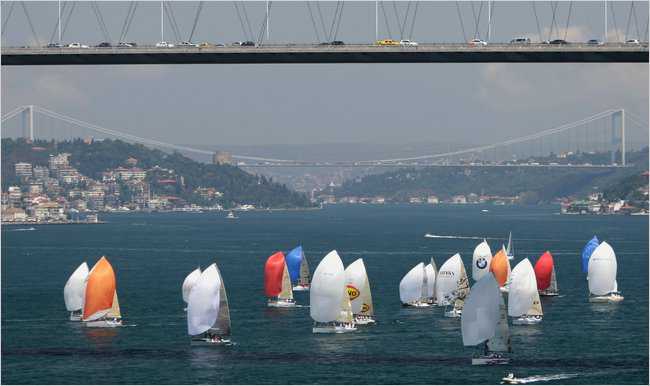Thomas Seibert
Oct 19, 2011
ISTANBUL // Turkey will begin writing its sixth constitution today – marking the first time the country has taken up the task outside imperial rule, wartime conditions or the shadows of a military coup.
Turkey’s current constitution was drawn up under military rule in 1982, two years after a coup, and is widely considered unsuitable because of the restrictions it has imposed on basic rights such as free speech. After winning a referendum on constitutional changes last year, Recep Tayyip Erdogan, the prime minister, promised to make the new constitution the centrepiece of the legislative term that began after June elections.
As Turkey prepared to tackle the historic task, Mr Erdogan drew attention to the wider significance of the project in a region shaken by the Arab Spring. Speaking at a meeting of his ruling Justice and Development Party (AKP) this week, he said Turks wanted their country to become an “advanced democracy”.
But the AKP, which won a landslide victory in parliamentary elections in June with almost 50 per cent of the vote, was not just representing Turkey, Mr Erdogan said, according to a transcript of his speech posted on the AKP’s website yesterday.
“The AKP is not just Turkey’s party, but a world party,” Mr Erdogan said. “From Mogadishu to Sarajevo, from Damascus to Skopje, from Sanaa to Bishkek, from Abu Dhabi to Islamabad, from Gaza to Benghazi, from Pristina to the Turkish Republic of Northern Cyprus – wherever there is a victim in the world, the AKP is at his side,” the prime minister said. “This is the kind of party we are.”
An “agreement commission”, made up by three members of each of the four parties represented in parliament and presided over by Cemil Cicek, the parliamentary speaker, would convene for its inaugural meeting today. Mr Erdogan said last week he hoped work on a new basic law could be wrapped up within a year.
Observers inside and outside the country have named Turkey as a model for countries such as Egypt, Tunisia and Libya that have shaken off dictatorships in uprisings this year. Hundreds of millions of people in the region followed Turkey’s elections, Mr Erdogan said in his speech. “Everybody who works for the AKP deeply feels that great responsibility.”
At today’s talks, AKP representatives will be joined by politicians from three opposition parties: the secularist Republican People’s Party (CHP), the right-wing Nationalist Movement Party (MHP) and the Party for Peace and Democracy (BDP), Turkey’s main Kurdish party.
The EU, which Turkey has hopes of joining, applauded a new constitution as a chance to advance democratic principles and to address problems such as the Kurdish conflict, but said all views on the subject should be heard.
“Due attention needs to be paid to ensuring the broadest possible consultation in this work, involving all political parties and civil society,” the EU said in a report last week.
In the run-up to the talks, critics voiced concerns that the AKP could try to steamroll other parties, but Mr Erdogan said his party would aim for a broad consensus.
“If we talk about democracy, we cannot allow a minority to dominate over the majority,” he told his party members, referring to the AKP’s majority in parliament, where it controls 327 of 550 seats. “But I also want to underline that we want to protect the rights of minorities.”
Mithat Sancar, a law professor at Ankara University, said the AKP’s decision to accept equal representation on the commission, as well as the decision to include the BDP even though it has been accused of ties to the militant Kurdistan Workers’ Party (PKK), were “hopeful signs”.
But, Prof Sancar said there were questions about how the new constitution would be written. “Will it be just parliament that is involved? How will civil society be integrated in the process? They have to talk about the method first,” he said.
Mr Erdogan’s personal agenda has also been questioned. Some critics have said the prime minister would try to use the constitutional talks to propose a switch from Turkey’s current parliamentary system to an American or French-style presidential one.
His preference for a presidential system was widely known, but the prime minister has not said whether he wants to push the issue during the talks. “The public does not know what is on Erdogan’s mind,” Prof Sancar said.
Even before the talks, some points on contention between the parties have emerged. The CHP, which was established by modern Turkey’s founder, Mustafa Kemal Ataturk, wanted to preserve the first articles of the current constitution, which defined Turkey as a secular republic and said the country was committed to “Ataturk nationalism”.
But Mr Erdogan stressed in his speech that the talks should be held without any preconditions.
via Turkey moves ahead with new constitution – The National.


